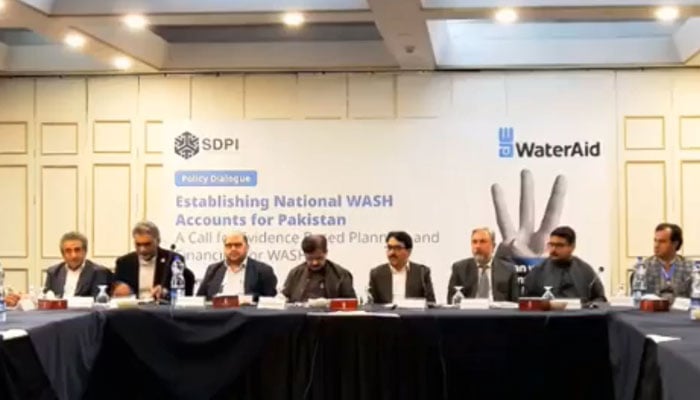National Wash Accounts termed vital for Pakistan to save lives
Islamabad : The establishment of a National Water, Sanitation, and Hygiene (Wash) Account in Pakistan is essential for building robust Wash infrastructure, tracking financial flows, and monitoring spending to ensure accountability and resilience in Wash services, asserted experts at a policy dialogue.
The event, organised by WaterAid Pakistan in partnership with the Sustainable Development Policy Institute (SDPI), also marked the launch of the policy brief, "Establishing National Wash Accounts for Pakistan: A Call for Evidence-Based Planning and Financing for Wash,” said a press release issued here. The dialogue brought together policymakers, stakeholders, and Wash experts to discuss a path forward for implementing National Wash Accounts through concerted efforts at both the federal and provincial levels.
WaterAid Pakistan’s Country Director, Mian Muhammad Junaid, underscored that over 20 countries have already established Wash Accounts, leading to structured planning, improved resource allocation, and enhanced accountability. “For Pakistan, the Wash Account would facilitate data-driven planning, meeting both humanitarian and development needs through a rights-based, integrated approach,” he stated, adding that improved WASH services have the potential to reduce the global disease burden by as much as 10 per cent.
He emphasised, “Now is the time for all stakeholders to come together and act decisively to ensure that every community in Pakistan has access to safe water and sanitation.”
The Deputy Executive Director SDPI and lead author of the Policy Brief, Dr Shafqat Munir Ahmad, highlighted key features of the study proposing to set up National WASH Account in Pakistan. He said the study suggests connecting federal, provincial, and other administrative units governments through the process of WASH Accounts to streamline data collection and planning in the WASH sector to improve the country’s ranking on the SDG-6. The policy brief provides a framework for developing a National WASH Account in Pakistan to tackle local challenges relating to water, sanitation, and hygiene.
Asghar Ali Halepoto, Chief of the Water Resource Section at the Ministry of Planning, Development & Special Initiatives raised concerns about accountability and resource management.
-
 Andrew Mountbatten-Windsor In A Fix Over New Disturbing TMZ Photos
Andrew Mountbatten-Windsor In A Fix Over New Disturbing TMZ Photos -
 Eric Dane Opened Up About Releasing His Memoir Just Two Months Before His Death Due To ALS Complications
Eric Dane Opened Up About Releasing His Memoir Just Two Months Before His Death Due To ALS Complications -
 Zendaya, Tom Holland Already Married? Actress Shows Off New Ring
Zendaya, Tom Holland Already Married? Actress Shows Off New Ring -
 King Charles Holds Emergency Meeting After Andrew Arrest: 'Abdication Is Not Happening'
King Charles Holds Emergency Meeting After Andrew Arrest: 'Abdication Is Not Happening' -
 Amazon Can Be Sued Over Sodium Nitrite Suicide Cases, US Court Rules
Amazon Can Be Sued Over Sodium Nitrite Suicide Cases, US Court Rules -
 'Vikings' Star Mourns Eric Dane's Death
'Vikings' Star Mourns Eric Dane's Death -
 Patrick Dempsey Reveals Eric Dane's Condition In Final Days Before Death
Patrick Dempsey Reveals Eric Dane's Condition In Final Days Before Death -
 'Heartbroken' Nina Dobrev Mourns Death Of Eric Dane: 'He'll Be Deeply Missed'
'Heartbroken' Nina Dobrev Mourns Death Of Eric Dane: 'He'll Be Deeply Missed' -
 Andrew Mountbatten-Windsor’s Arrest: What Happened When A Royal Was Last Tried?
Andrew Mountbatten-Windsor’s Arrest: What Happened When A Royal Was Last Tried? -
 Alyssa Milano Expresses Grief Over Death Of 'Charmed' Co-star Eric Dane
Alyssa Milano Expresses Grief Over Death Of 'Charmed' Co-star Eric Dane -
 Prince William, Kate Middleton Camp Reacts To Meghan's Friend Remarks On Harry 'secret Olive Branch'
Prince William, Kate Middleton Camp Reacts To Meghan's Friend Remarks On Harry 'secret Olive Branch' -
 Daniel Radcliffe Opens Up About 'The Wizard Of Oz' Offer
Daniel Radcliffe Opens Up About 'The Wizard Of Oz' Offer -
 Channing Tatum Reacts To UK's Action Against Andrew Mountbatten-Windsor
Channing Tatum Reacts To UK's Action Against Andrew Mountbatten-Windsor -
 Brooke Candy Announces Divorce From Kyle England After Seven Years Of Marriage
Brooke Candy Announces Divorce From Kyle England After Seven Years Of Marriage -
 Piers Morgan Makes Meaningful Plea To King Charles After Andrew Arrest
Piers Morgan Makes Meaningful Plea To King Charles After Andrew Arrest -
 Sir Elton John Details Struggle With Loss Of Vision: 'I Can't See'
Sir Elton John Details Struggle With Loss Of Vision: 'I Can't See'




